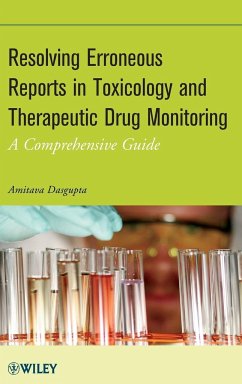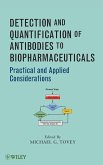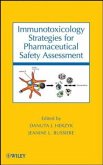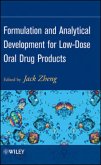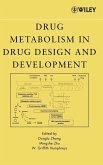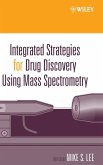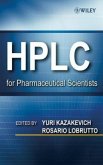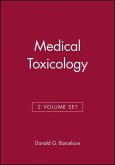The tools for detecting false positives, false negatives, and interference in interactions when testing and monitoring therapeutic drug use
For physicians monitoring a patient's progress, efficacy of treatment is often linked to a patient's response to medication. Determining whether a patient is taking the prescribed amount, the drug or dosage is effective, or the prescribed medication is interacting with other drugs can be determined through drug testing. Written as a guide for toxicologists, chemists, and health professionals involved in patient care, Resolving Erroneous Reports in Toxicology and Therapeutic Drug Monitoring provides an up-to-date introduction to the tests and methodologies used in a toxicology lab as well as the sources of testing error that can lead to false positives, false negatives, and unreliable conclusions of drug abuse or under use.
Covering a host of common therapeutic drugs as well as specific types of interference in immunoassays used in drug testing, the book details a number of possible testing scenarios and problems as well as solutions:
False positive results in immunoassays for drugs in abuse testing
Interferences in immunoassays used for monitoring anticonvulsants, tricyclic antidepressants, and digoxin
False positive alcohol tests using breath analyzers and automated analyzers
When a toxicology report is negative in a suspected overdose patient: the world of designer drugs
Effects of drug-herb interactions on therapeutic drug monitoring
Pharmacogenomics and the general principles of genetic analysis
Approaches for eliminating interference/discordant specimen in therapeutic drug monitoring and drugs in abuse testing
What to do in case there is no readily available method for testing
Complete with easy-to-read tables and flowcharts, this book helps toxicologists, clinical chemists, clinical pathologists, and forensic pathologists develop accurate, unbiased drug monitoring and toxicology reports. Health care professionals involved in patient care, especially of critically ill patients, will find this guide indispensable in making sure lab tests are reliable enough to provide high-quality care. An indispensable handbook to the entire suite of toxicology lab tests, as well as all the possible sources of testing error, Resolving Erroneous Reports in Toxicology and Therapeutic Drug Monitoring offers clear remedies for eliminating and preventing testing error.
Hinweis: Dieser Artikel kann nur an eine deutsche Lieferadresse ausgeliefert werden.
For physicians monitoring a patient's progress, efficacy of treatment is often linked to a patient's response to medication. Determining whether a patient is taking the prescribed amount, the drug or dosage is effective, or the prescribed medication is interacting with other drugs can be determined through drug testing. Written as a guide for toxicologists, chemists, and health professionals involved in patient care, Resolving Erroneous Reports in Toxicology and Therapeutic Drug Monitoring provides an up-to-date introduction to the tests and methodologies used in a toxicology lab as well as the sources of testing error that can lead to false positives, false negatives, and unreliable conclusions of drug abuse or under use.
Covering a host of common therapeutic drugs as well as specific types of interference in immunoassays used in drug testing, the book details a number of possible testing scenarios and problems as well as solutions:
False positive results in immunoassays for drugs in abuse testing
Interferences in immunoassays used for monitoring anticonvulsants, tricyclic antidepressants, and digoxin
False positive alcohol tests using breath analyzers and automated analyzers
When a toxicology report is negative in a suspected overdose patient: the world of designer drugs
Effects of drug-herb interactions on therapeutic drug monitoring
Pharmacogenomics and the general principles of genetic analysis
Approaches for eliminating interference/discordant specimen in therapeutic drug monitoring and drugs in abuse testing
What to do in case there is no readily available method for testing
Complete with easy-to-read tables and flowcharts, this book helps toxicologists, clinical chemists, clinical pathologists, and forensic pathologists develop accurate, unbiased drug monitoring and toxicology reports. Health care professionals involved in patient care, especially of critically ill patients, will find this guide indispensable in making sure lab tests are reliable enough to provide high-quality care. An indispensable handbook to the entire suite of toxicology lab tests, as well as all the possible sources of testing error, Resolving Erroneous Reports in Toxicology and Therapeutic Drug Monitoring offers clear remedies for eliminating and preventing testing error.
Hinweis: Dieser Artikel kann nur an eine deutsche Lieferadresse ausgeliefert werden.

